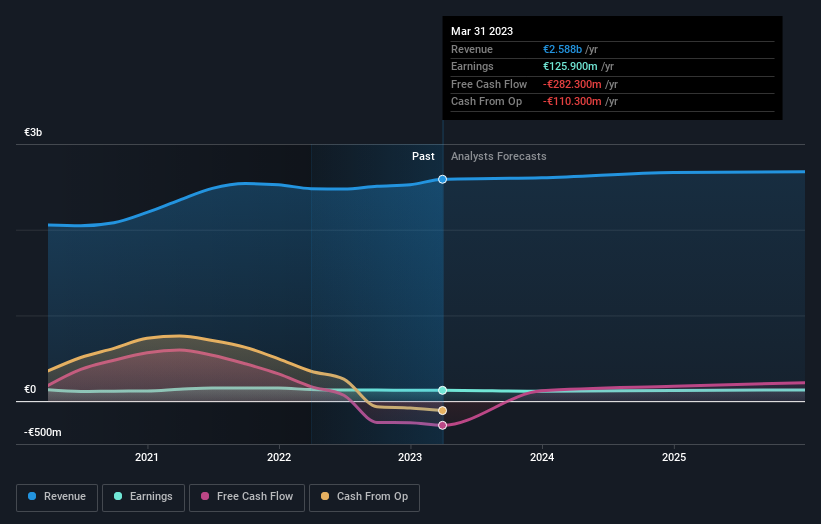Stock Analysis
Österreichische Post AG (VIE:POST) stock most popular amongst private companies who own 53%, while individual investors hold 42%

Key Insights
- Significant control over Österreichische Post by private companies implies that the general public has more power to influence management and governance-related decisions
- 53% of the company is held by a single shareholder (Österreichische Beteiligungs AG)
- Analyst forecasts along with ownership data serve to give a strong idea about prospects for a business
If you want to know who really controls Österreichische Post AG (VIE:POST), then you'll have to look at the makeup of its share registry. The group holding the most number of shares in the company, around 53% to be precise, is private companies. Put another way, the group faces the maximum upside potential (or downside risk).
Individual investors, on the other hand, account for 42% of the company's stockholders.
Let's delve deeper into each type of owner of Österreichische Post, beginning with the chart below.
See our latest analysis for Österreichische Post

What Does The Institutional Ownership Tell Us About Österreichische Post?
Institutions typically measure themselves against a benchmark when reporting to their own investors, so they often become more enthusiastic about a stock once it's included in a major index. We would expect most companies to have some institutions on the register, especially if they are growing.
As you can see, institutional investors have a fair amount of stake in Österreichische Post. This can indicate that the company has a certain degree of credibility in the investment community. However, it is best to be wary of relying on the supposed validation that comes with institutional investors. They too, get it wrong sometimes. It is not uncommon to see a big share price drop if two large institutional investors try to sell out of a stock at the same time. So it is worth checking the past earnings trajectory of Österreichische Post, (below). Of course, keep in mind that there are other factors to consider, too.

Österreichische Post is not owned by hedge funds. Österreichische Beteiligungs AG is currently the company's largest shareholder with 53% of shares outstanding. With such a huge stake in the ownership, we infer that they have significant control of the future of the company. For context, the second largest shareholder holds about 1.8% of the shares outstanding, followed by an ownership of 1.5% by the third-largest shareholder.
While studying institutional ownership for a company can add value to your research, it is also a good practice to research analyst recommendations to get a deeper understand of a stock's expected performance. There are a reasonable number of analysts covering the stock, so it might be useful to find out their aggregate view on the future.
Insider Ownership Of Österreichische Post
While the precise definition of an insider can be subjective, almost everyone considers board members to be insiders. The company management answer to the board and the latter should represent the interests of shareholders. Notably, sometimes top-level managers are on the board themselves.
I generally consider insider ownership to be a good thing. However, on some occasions it makes it more difficult for other shareholders to hold the board accountable for decisions.
We note our data does not show any board members holding shares, personally. It is unusual not to have at least some personal holdings by board members, so our data might be flawed. A good next step would be to check how much the CEO is paid.
General Public Ownership
With a 42% ownership, the general public, mostly comprising of individual investors, have some degree of sway over Österreichische Post. This size of ownership, while considerable, may not be enough to change company policy if the decision is not in sync with other large shareholders.
Private Company Ownership
It seems that Private Companies own 53%, of the Österreichische Post stock. Private companies may be related parties. Sometimes insiders have an interest in a public company through a holding in a private company, rather than in their own capacity as an individual. While it's hard to draw any broad stroke conclusions, it is worth noting as an area for further research.
Next Steps:
I find it very interesting to look at who exactly owns a company. But to truly gain insight, we need to consider other information, too. Case in point: We've spotted 2 warning signs for Österreichische Post you should be aware of.
But ultimately it is the future, not the past, that will determine how well the owners of this business will do. Therefore we think it advisable to take a look at this free report showing whether analysts are predicting a brighter future.
NB: Figures in this article are calculated using data from the last twelve months, which refer to the 12-month period ending on the last date of the month the financial statement is dated. This may not be consistent with full year annual report figures.
Valuation is complex, but we're helping make it simple.
Find out whether Österreichische Post is potentially over or undervalued by checking out our comprehensive analysis, which includes fair value estimates, risks and warnings, dividends, insider transactions and financial health.
View the Free AnalysisHave feedback on this article? Concerned about the content? Get in touch with us directly. Alternatively, email editorial-team (at) simplywallst.com.
This article by Simply Wall St is general in nature. We provide commentary based on historical data and analyst forecasts only using an unbiased methodology and our articles are not intended to be financial advice. It does not constitute a recommendation to buy or sell any stock, and does not take account of your objectives, or your financial situation. We aim to bring you long-term focused analysis driven by fundamental data. Note that our analysis may not factor in the latest price-sensitive company announcements or qualitative material. Simply Wall St has no position in any stocks mentioned.
About WBAG:POST
Österreichische Post
Provides postal and parcel services in Austria, Germany, Southeast and Eastern Europe, Türkiye, Azerbaijan, and internationally.
Undervalued with proven track record.

